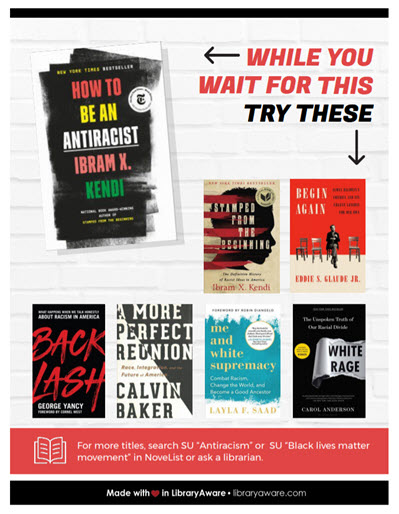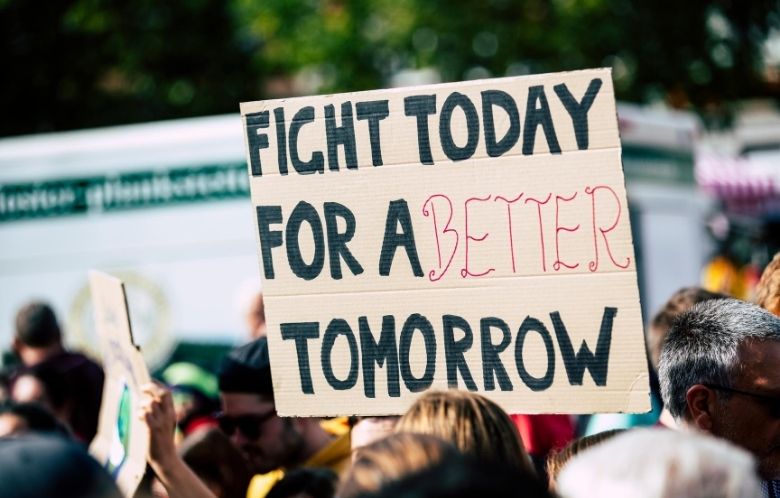Maybe you're seeing something similar as you search your library catalog?
As white Americans embark on ambitious anti-racism summer reading projects, white Americans must also confront the difficult realization that everyone else had the exact same idea.
Waiting on a book is hard and waiting on these books is especially hard because this learning really can’t wait. (And for your patrons who may have been assigned this reading by teachers, bosses, or book clubs, it really, really can’t wait.)
However, I have good news! Although you might not be able to borrow one specific book at this moment in time, you will never run out of books to read. They might not be bestsellers, or they might be the bestsellers of a few years ago (attention spans are short!), but they are all worth reading.
Here are some potential pathways to follow, depending on your interests:
The Big Issues
There is no part of American life untouched by white supremacy, no problem that's not exacerbated by structural racism. And white people are (finally!) beginning to understand this…which is why you currently can’t get your hands on a copy of Michelle Alexander’s The New Jim Crow: Mass Incarceration in the Age of Colorblindness (wait time: at least 6 months).
Fortunately, you have options. For just about any complex social issue, you can find a well-researched and compelling book that delves into it in satisfying detail, such as Matthew Desmond's Evicted or Richard Rothstein's The Color of Law (housing policy); Paul Butler's Chokehold or Andrea J. Ritchie's Invisible No More (police brutality); Harriet A. Washington's Medical Apartheid or Dana Ain-Davis’ Reproductive Injustice (racism in medicine); and Safiya Umoja Noble's Algorithms of Oppression or Ruha Benjamin's Race after Technology (race and technology).
Frankly, this is what subject searches were made for. Pro tip: you can pair SU “racism” with just about any subject heading and find an abundance of resources (which is maybe the saddest example of a pro tip ever). Here are a few to get you started:
- SU “Black lives matter movement”
- SU “criminal justice system”
- SU “voter suppression”
- SU “gentrification of cities”
- SU “income inequality”
History
History is another excellent avenue for learning what you (and everyone) should have learned in school but maybe didn’t. Black History Month is the shortest month and while Black history is everyone’s history, it too often gets cordoned off from the rest.
Of course, knowing all that doesn’t help much when you’re the 105th person in line for Carol Anderson’s thought-provoking White Rage (wait time: at least 6 months), Ibram X. Kendi’s comprehensive Stamped from the Beginning (wait time: at least six months), or Isabel Wilkerson's superlative history of the Great Migration, The Warmth of Other Suns (wait time: about 18 weeks).
NoveList customers can avail themselves of hand-curated Recommended Reads lists on African American History (just pop UI 427561 into the search box) and the American Civil Rights Movement (do the same with UI 432627).
If you’re looking for more subject-specific recommendations, try David Zucchino’s Wilmington’s Lie: The Murderous Coup of 1898 and the Rise of White Supremacy and Jeanne Theoharis’ A More Beautiful and Terrible History: The Uses and Misuses of Civil Rights History, both of which compare and contrast actual events with popular (mis)conceptions of them. I also recommend the Revisioning History series, which offers comprehensive accounts of U.S. history that center marginalized groups (including Black, Latinx, Indigenous, LGBTQIA, and disabled people).
Society and Culture
Personally, I love essay collections, which combine the pleasures of goofing around on the internet when you’re supposed to be working with the cultural capital of reading an *actual book.*
Plenty of readers agree — just try finding a copy of Roxane Gay’s Bad Feminist (wait time: about 12 weeks) or Mikki Kendall’s Hood Feminism (wait time: at least 6 months).
Fortunately, discovering brilliant Black women essayists is like scrolling through Netflix: you can try but you will never reach the end. And why would you want to?
The following collections range from hilarious to heart-wrenching and offer a variety of insightful and highly individual perspectives on race and culture: Emily Bernard’s Black is the Body, Keah Brown’s The Pretty One, Tressie McMillan Cottom's Thick, Emma Dabiri's Twisted: The Tangled History of Black Hair Culture, Lauren Michele Jackson's White Negroes: When Cornrows Were in Vogue…and Other Thoughts on Cultural Appropriation, and Phoebe Robinson’s You Can’t Touch My Hair.
Memoirs
Memoirs invite readers into other people’s lives, both ordinary and extraordinary.
Everyone loves Michelle Obama's Becoming (wait time: available soon!!!), while just about every book club in existence seems to be reading Bryan Stevenson’s Just Mercy (wait time: about 24 weeks), but there is no shortage of excellent memoirs out there, from Nefertiti Austin’s Motherhood So White to Saeed Jones’ How We Fight for Our Lives to Kiese Laymon’s Heavy.
Once again, NoveList’s Recommended Reads lists offer a rotating selection of curated books: check out African American Life Stories (UI 445899).
Memoirs remind us (and we seem to need reminding) that Black lives matter at the individual, as well as the societal level.
Fiction
Too often, when we talk about books, we talk in hashtags (#WeNeedDiverseBooks, #ownvoices) and don’t follow it up with action. We talk about “Mirrors and Windows” or “intersectionality” without giving credit where credit is due. And we talk about the importance of empathy without always demonstrating it.
We can all do better, and fiction might be one of our most powerful tools for change. As romance superstar Jasmine Guillory reminds us: “Black lives are not a problem to be solved or an academic text that can be studied. To recognize Black lives as ones to celebrate, empathize with and care about, here’s your antiracism work: read more fiction by and about Black people.”
And it’s not hard to do! Although you may not be able to check out Brit Bennett’s The Vanishing Half (wait time: at least 6 months) or Colson Whitehead’s The Nickel Boys (wait time: about 13 weeks) this very instant, you can choose from an infinite variety of books by and about Black people.
You can use NoveList’s diversity appeals to craft searches. You can also add NoveList themes to the mix:
- TH Facing racism
- TH Engendering gender
- TH Immigrant experiences
As a genre specialist, I’ll end by saying that these books don’t have to be literary novels. If you like genre fiction, read genre fiction! Depending on your reading preferences, you might enjoy Talia Hibbert's hilarious and steamy Take a Hint, Dani Brown, Alaya Dawn Johnson's atmospheric historical fantasy Trouble the Saints, or S.A. Cosby's noirish heist thriller Blacktop Wasteland. No matter what you enjoy, your library has something that will expand your horizons.

Download the flyer or make your own on LibraryAware.
Gillian Speace is a Readers' Advisory Librarian at NoveList who is currently listening to season 4 of Scene on Radio: The Land that Never Was Yet.
